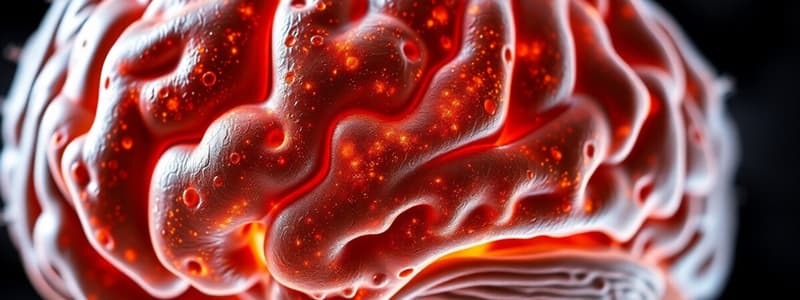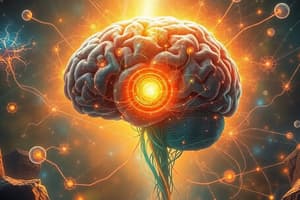Podcast
Questions and Answers
What is required for memory consolidation according to the content?
What is required for memory consolidation according to the content?
- Reduction of neurotransmitter release
- Increase in synaptic density
- Inhibition of protein kinase activity
- Phosphorylation of GluR1 at S845 (correct)
Which protein kinase is mentioned as being involved in the phosphorylation of GluR1?
Which protein kinase is mentioned as being involved in the phosphorylation of GluR1?
- AMP-activated protein kinase (AMPK)
- Extracellular signal-regulated kinase (ERK)
- Cyclic nucleotide phosphodiesterase (PDE)
- Protein kinase A (PKA) (correct)
What is NOT sufficient for the delivery of GluR1 into the synapses?
What is NOT sufficient for the delivery of GluR1 into the synapses?
- Protein kinase A (PKA) activation
- Increase in calcium ion concentration
- Activity of AP2
- Phosphorylation of GluR1 at S845 (correct)
According to the content, which process is highlighted as being necessary for the delivery of GluR1?
According to the content, which process is highlighted as being necessary for the delivery of GluR1?
What role does AP2 play in relation to GluR1?
What role does AP2 play in relation to GluR1?
What is the maximum duration for which letter memory lasts, as indicated in the content?
What is the maximum duration for which letter memory lasts, as indicated in the content?
In the context of location memory, what was the finding of later research?
In the context of location memory, what was the finding of later research?
What aspect of memory does the Brown-Peterson Technique primarily investigate?
What aspect of memory does the Brown-Peterson Technique primarily investigate?
What happens to the probability of response as latency increases?
What happens to the probability of response as latency increases?
Which of the following time intervals indicates the latency threshold for successful recall?
Which of the following time intervals indicates the latency threshold for successful recall?
What was the conclusion regarding successive presentations in memory tasks?
What was the conclusion regarding successive presentations in memory tasks?
According to the presented information, which statement about the Brown-Peterson Technique is accurate?
According to the presented information, which statement about the Brown-Peterson Technique is accurate?
What percentage of digram sequences in a protocol with 70% male names and 30% female names would consist of female names followed by male names?
What percentage of digram sequences in a protocol with 70% male names and 30% female names would consist of female names followed by male names?
In the research by Peterson & Peterson, how were the names organized in the free recall procedure?
In the research by Peterson & Peterson, how were the names organized in the free recall procedure?
What was the age range of subjects who participated in the study?
What was the age range of subjects who participated in the study?
What was the overall trend for male subjects in terms of recalling male names compared to female names?
What was the overall trend for male subjects in terms of recalling male names compared to female names?
Which organizational effect does the study imply might be at play when grouping names by sex?
Which organizational effect does the study imply might be at play when grouping names by sex?
What was the primary method used to assess memory in the study?
What was the primary method used to assess memory in the study?
How were the results of the memory recall categorized?
How were the results of the memory recall categorized?
According to the study, what was the percentage of male names followed by male names in the free recall?
According to the study, what was the percentage of male names followed by male names in the free recall?
What does the study imply about gender in memory organization?
What does the study imply about gender in memory organization?
What was the observed frequency of yes-no recognition for sex alternation among the 40 subjects?
What was the observed frequency of yes-no recognition for sex alternation among the 40 subjects?
What statistical method was used to test the differences in recognition frequency?
What statistical method was used to test the differences in recognition frequency?
How did the recognition accuracy in free recall change over time?
How did the recognition accuracy in free recall change over time?
What was the accuracy rate in recognition for subjects with 48 years of retention?
What was the accuracy rate in recognition for subjects with 48 years of retention?
What was compared between the 20 male and 20 female subjects in the study?
What was compared between the 20 male and 20 female subjects in the study?
What was the significance level reported in the study?
What was the significance level reported in the study?
Which subgroup had a comparison made regarding alternation frequency?
Which subgroup had a comparison made regarding alternation frequency?
What was the maximum recognition accuracy after 15 years of retention?
What was the maximum recognition accuracy after 15 years of retention?
What was unique about the organization of the free-recall sequence?
What was unique about the organization of the free-recall sequence?
Which group had a record of 20 subjects in the study?
Which group had a record of 20 subjects in the study?
What indicates how well an item was learned in memory theory?
What indicates how well an item was learned in memory theory?
What happens to retrieval strength over time according to decay theories?
What happens to retrieval strength over time according to decay theories?
What term describes an improvement in recall performance despite no additional training?
What term describes an improvement in recall performance despite no additional training?
Why was decay theory rejected as a good explanation for memory loss?
Why was decay theory rejected as a good explanation for memory loss?
According to Bjork & Bjork, how can old memories become less accessible?
According to Bjork & Bjork, how can old memories become less accessible?
Which of the following statements best reflects the principle of 'you don't use it, you lose it'?
Which of the following statements best reflects the principle of 'you don't use it, you lose it'?
What does the concept of reminiscence mean in memory retrieval?
What does the concept of reminiscence mean in memory retrieval?
What aspect of memory does the decay theory primarily focus on?
What aspect of memory does the decay theory primarily focus on?
Which phenomenon resulted in a shift from decay theory to interference-based theories in psychology?
Which phenomenon resulted in a shift from decay theory to interference-based theories in psychology?
Which factor directly affects both storage strength and retrieval strength?
Which factor directly affects both storage strength and retrieval strength?
Flashcards
Short-Term Memory
Short-Term Memory
A mental storage system with a limited capacity for holding information for a brief period of time, typically around 20 seconds, unless the information is actively rehearsed.
Brown-Peterson Technique
Brown-Peterson Technique
The Brown-Peterson Technique is a classic experiment designed to study the duration of short-term memory. It involves presenting participants with a list of items to remember (usually trigrams, like letters), followed by a distracting task (like counting backwards), and then asking them to recall the original items.
Decay in Short-Term Memory
Decay in Short-Term Memory
The Brown-Peterson Technique demonstrates that the duration of short-term memory is limited, with information being lost rapidly if it's not actively rehearsed. This is known as "decay", where information simply fades away over time.
Location vs. Letter Memory
Location vs. Letter Memory
Signup and view all the flashcards
Duration of Location & Letter Memory
Duration of Location & Letter Memory
Signup and view all the flashcards
Whole Report Method
Whole Report Method
Signup and view all the flashcards
Latency in Memory
Latency in Memory
Signup and view all the flashcards
GluR1 Phosphorylation
GluR1 Phosphorylation
Signup and view all the flashcards
Protein Kinase A (PKA)
Protein Kinase A (PKA)
Signup and view all the flashcards
GluR1 Delivery to Synapses
GluR1 Delivery to Synapses
Signup and view all the flashcards
GluR1 in Synaptic Plasticity
GluR1 in Synaptic Plasticity
Signup and view all the flashcards
Synapses and GluR1
Synapses and GluR1
Signup and view all the flashcards
Long-Term Memory
Long-Term Memory
Signup and view all the flashcards
Free Recall
Free Recall
Signup and view all the flashcards
Peterson & Peterson 1959 Experiment
Peterson & Peterson 1959 Experiment
Signup and view all the flashcards
Free Recall of Names
Free Recall of Names
Signup and view all the flashcards
Memory Duration
Memory Duration
Signup and view all the flashcards
Clustering by Sex
Clustering by Sex
Signup and view all the flashcards
Digram Sequence
Digram Sequence
Signup and view all the flashcards
Primary Organization
Primary Organization
Signup and view all the flashcards
Secondary Organization
Secondary Organization
Signup and view all the flashcards
Decay Theory of Forgetting
Decay Theory of Forgetting
Signup and view all the flashcards
Retrieval Strength Decay
Retrieval Strength Decay
Signup and view all the flashcards
Storage Strength
Storage Strength
Signup and view all the flashcards
Retrieval
Retrieval
Signup and view all the flashcards
Reminiscence
Reminiscence
Signup and view all the flashcards
Hypermnesia
Hypermnesia
Signup and view all the flashcards
Interference Theory of Forgetting
Interference Theory of Forgetting
Signup and view all the flashcards
Retroactive Interference
Retroactive Interference
Signup and view all the flashcards
Proactive Interference
Proactive Interference
Signup and view all the flashcards
Retrieval Cues
Retrieval Cues
Signup and view all the flashcards
Picture Matching
Picture Matching
Signup and view all the flashcards
Sex Alternation
Sex Alternation
Signup and view all the flashcards
Chi-square Test
Chi-square Test
Signup and view all the flashcards
Recognition
Recognition
Signup and view all the flashcards
Memory Decay
Memory Decay
Signup and view all the flashcards
Retention
Retention
Signup and view all the flashcards
Group
Group
Signup and view all the flashcards
Comparison
Comparison
Signup and view all the flashcards
Study Notes
PSYC 303 | L11 FORGETTING
- Covering various theories of forgetting
- Including introduction, classical and active decay, interference, retrieval failure, and motivated forgetting.
OVERVIEW
- Introduction
- Classical and active decay
- Interference
- Retrieval failure
- Motivated forgetting
INTRODUCTION
- The Modal Model assigns a specific forgetting form to each memory store.
- Forgetting can result from retrieval errors in long-term memory (LTM).
DURATION OF MEMORIES
- Predictions of the Modal Model
- Environmental Input leading to sensory register
- Attention leading to rehearsal, followed by decay/loss in STM
- Recall and rehearsal leading to long-term memory (LTM)
- Decay/interference can lead to loss in STM
- Retrieval error leading to loss in LTM
MEMORY DURATION ESTIMATES
-
Iconic Memory: Whole Report Experiment
-
Duration of iconic memory, 500ms, with assumed capacity of 4-5 items
-
Later research showed location is lost within 500ms.
-
Letter Memory lasts at least 1 second.
-
Short-Term Memory: Brown-Peterson Task
-
Technique measures STM duration by preventing rehearsal.
-
Participants count backwards from a given number interrupting rehearsal of the stimulus.
-
Average STM duration estimated to be 18 seconds.
-
Long-Term Memory: Memory for People
-
Procedure (392 participants, 17-74 years old)
-
Free recall of high school class mates' names.
-
Yes-no recognition of faces and names.
-
Face-name matching.
-
Results
-
80% (48 years retention)-90% (up to 34 years) accuracy in recognition tests.
-
Free recall accuracy between 60% (15 years retention) and 30% (48 years).
-
Long-Term Memory: "Permastore"
-
Reading comprehension, Spanish-English recall, and recognition tests.
-
25 years retention for faces of classmates
-
48 years retention 75-80% matching name to photo.
-
High-school algebra retained for 50 years.
-
Long-Term Memory: First Diary Study
-
Percentage of items recalled and Age of items
-
Example of long-term memory persistence
-
Long-Term Memory: Autobiographical Memory
-
Procedure with participants ranging in age from 17-74 years old.
-
Memory retention of salience, emotional involvement, and pleasantness.
-
Retention periods from 1-7 years.
MEMORY DURATION ESTIMATES
- Flashbulb Memories
- Memory for the circumstances in which one learned of a public event
- Example events Include, 9/11, Death of Diana, Columbia Space Shuttle.
A DOMINANT VIEW
- The Perseveration-Consolidation hypothesis
- Current Consolidation "dogma"
- Consolidated memories are stable and persist long-term.
- Consolidation is a transient and unidirectional process that occurs after acquisition.
- Disrupting consolidation impairs memory retention.
MYSTERY OF FORGETTING
- Forgetting seen as a failure of memory processes
- 'Not memory, but forgetting is the mystery'
- Erasure/storage failure
- Memory disruption
- Retrieval failure
NO MEMORY WITHOUT FORGETTING
- What would life be without forgetting?
- Example of Funes the Memorious
- Case study of a person with exceptional autobiographical memory.
HIGHLY SUPERIOR AUTOBIOGRAPHICAL MEMORY
- Participants' exceptional autobiographical memory accuracy
- Associations with names-to-faces tasks and word recognition.
- Performance better for personal life episodes.
- Elaborate and detailed information for remote life events, similar to controls.
- No differences in verbal, prospective, semantic memory, mental imagery, creative abilities and critical thinking
- No differences in general intelligence and working memory capacity
- Similar amount of false memories.
- Demonstrated stronger obsessive-compulsive behaviors than controls.
CLASSICAL AND ACTIVE DECAY
- Decay & Interference
- Definition of Interference: New learning can overwrite existing memory
- Definition of Decay: Memory weakens over time, eventually lost
- Classic Trace Decay Hypothesis
DECAY THEORIES
- A New theory of Disuse (Trace Decay).
- Focus on retrieval failure, not storage component.
- Definitions of Storage strength (indicates how well an item was learned) and Retrieval strength (indicates how well an item can currently be accessed).
- Theory assumes that storage strength will not be reduced
- Retrieval strength changes over time and as a function of retrieval.
- Increased Adaptability: Over time, old memories can become less accessible.
- Use can strengthen memories.
USE CAN STRENGTHEN MEMORIES
- Reminiscence: When subjects repeatedly retrieve a specific memory (e.g., a word list).
- Hypermnesia: An overall increase in the number of remembered items; recall of items not recalled in earlier tests.
- Testing Effect: An overall increase in the number of remembered items.
TOWARDS A MODERN DECAY THEORY
- Memories are made by changing the structure of synapses.
- Learning involves sending signals to change synapse.
- Formation of memory involves increasing the number of connectors at the synapse.
- Loss of memory during decay involves removal of connectors (AMPARs).
- Blocking the removal of AMPA receptors stops forgetting.
- Blocking AMPARs in the hippocampus preserve allocentric memory.
- GluN2B/NMDAR expression correlates with imprinting period.
- Enhancing plasticity accelerates forgetting.
ACTIVE DECAY
- Long-term memory not lost due to decay
- Built-in mechanisms governing forgetting
- Active forgetting automatically eliminates modifications to synapses formed during learning.
- A promiscuous encoding strategy is possibly the reason for built-in passive decay.
- Active decay an example of memory curation to keep only important memories.
POSSIBLE FUNCTIONS OF ACTIVE DECAY
- Preventing active decay in the hippocampus may have preserved spatial knowledge normally forgotten
- Preserving spatial information permits animals to discriminate a novel context
- Active decay memory preserved memory in a similar state that memories are shortly after training.
POSSIBLE FUNCTIONS OF ACTIVE FORGETTING
- Generalization Allows the recognition of instances of a category.
- Development of Categories
- Stronger forgetting in representing perceptual details.
- Instances within the same category share feature conjunctions.
POSSIBLE FUNCTIONS OF ACTIVE DECAY
- Cognitive Flexibility Requires Active Decay
- Trained mice to find a platform at location A, then the platform was moved to another location.
- Mice who had a genetic blockade to active decay found it harder to forget the prior location.
- This is important for learning, as it demonstrates learning and forgetting is important for cognitive flexibility.
LINKING AUTISM, COGNITIVE FLEXIBILITY AND ACTIVE DECAY
- Slower forgetting in fMR1-KO
- Impaired reversal learning in fMR1-KO
- Humans with autism show behavioral inflexibility.
- KO flies had less forgetting, impaired reversal learning, less forgetting of outdated memories.
INTERFERENCE
- Interference as a Retrieval Problem
- Retrieval cue competition - Over time, the same cue becomes associated with more possible targets.
- Cue competition - Items compete for retrieval
- Cue overload - More competitors lead to a pronounced interference effect.
FORMS OF INTERFERENCE IN LEARNING
- Proactive interference: Older memories interfere with new memories.
- Retroactive interference: Newer memories interfere with older memories.
AN EARLY DEMONSTRATION
- Retroactive Interference in Cockroaches
- A demonstration using cockroaches in a treadmill to show how activity after learning can interfere with the old learning.
- Measure of the loss in cockroach memory after a certain interval.
RETROACTIVE INTERFERENCE
- The stronger the new learning, the stronger the retroactive interference
- Example of retroactive interference task using paired associates.
PROACTIVE INTERFERENCE
- The more previous learning, the stronger the proactive interference
- Example of proactive interference task using paired associates.
PART-SET CUING
- Part-set cuing impairment: the recall of non-cued items is worse when some items are already presented as cues.
- May explain collaborative inhibition
RETRIEVAL-INDUCED FORGETTING
- Retrieval-induced forgetting is when non-retrieved items are recalled worse than retrieved items or items in categories that were not retrieved earlier during retrieval practice.
- Practical Implications of Retrieval-Induced Forgetting
- Interrogation, therapeutic use, and observer effects.
DIFFERENCES BETWEEN PARADIGMS
- Part-set cuing versus Retrieval Practice
- Subtle differences in the paradigms used to study interference.
POSSIBLE INTERFERENCE MECHANISMS
- Associative Blocking (or response competition).
- Associative Unlearning.
- Inhibition.
INHIBITION MAY EXPLAIN RETRIEVAL-INDUCED FORGETTING
- Divided Attention - reduced attentional resources
- Effect of Stress on Retrieval-Induced Forgetting - Stress can abolish retrieval-induced forgetting.
RETRIEVAL FAILURE
- Two possible positions on forgetting
- Nothing is ever really lost
- Real memory loss exists
AVAILABLE, BUT NOT ACCESSIBLE
- Demonstration that proper cues can overcome forgetting.
- Context-Dependent Memory.
REMINDER
- Encoding-Specificity Principle
- Transfer-Appropriate Processing
OPTOGENETIC DEMONSTRATION
- Method to label cells in dentate gyrus expressing c-Fos
- Neuronal activity leads to c-Fos expression.
- Only when animals not given Dox, the light-sensitive ion channel expresses in dentate gyrus.
- Activating the channel causes neurons to fire.
ANIMALS EXPRESS FEAR BEHAVIOUR
- Animals express fear behavior when "learning" neurons are activated.
- Context A (24 hours) and B (24 hours)
- Test 1 and 2 contexts.
REVISITING THE OPPOSING POSITIONS
- Retrieval failure.
- Storage failure.
EPISTEMOLOGICAL PROBLEM
- Retrieval failure.
- Storage failure.
- Standard experimental approach cannot decide the issue.
AN APPROACH TO FAIRLY TEST THE POSITIONS
- Two orthogonal predictions.
SECOND CONTEXTUAL FEAR CONDITIONING
- Amnesia induced with a standard intervention.
- Second learning of contextual fear requires NMDA receptors in the amnesic animals.
SECOND LEARNING AFTER EXTINCTION
- Extinction reflects inhibition not loss of memory.
- Animals can acquire second contextual fear conditioning without the processing.
HOW TO RECONCILE THESE FINDINGS
- All consolidation theories argue that the hippocampus is necessary for event-like memories.
- This requires a storage index representation in the hippocampus (which needs NMDARs).
- Loss of this index therefore prevents retrieval of the context memory.
MOTIVATED FORGETTING
- Methods: participants see images.
- Free Recall and Yes/No Recognition
- Results: Older people recall fewer details and images are less recognized.
POSSIBLE REASONS FOR THE POSITIVITY BIAS
- Sense of well-being.
- Emotion regulation
- Emotional responses regulated cognitively.
POSSIBLE REASONS FOR THE POSITIVITY BIAS
- Freud's three psychic elements and their interactions.
- Consciousness and unconscious states
- Ego's function
DIRECTED FORGETTING
- Forgetting on command
- Item-method
- List-method
DIRECTED FORGETTING
- Item-method directed forgetting requires greater effort than encoding.
DIRECTED FORGETTING
- List method paradigm
- Results: List 1 memory less than List 2 in Forget group
- Proactive interference found in remember group, not in the forget group
DIRECTED FORGETTING
- Item method and list method differences
- List-based forgetting participants may not know until after List 1 until they have to forget it.
- Item-based directed forgetting inhibits encoding of the item.
DIRECTED FORGETTING
- Retrieval Inhibition Hypothesis - Forget instructions inhibit unwanted List 1 items.
- Context Shift Hypothesis - Forget instruction results in separate lists.
RETRIEVAL SUPPRESSION
- Think/No-Think Paradigm
- Retrieval suppression tasks
- Positive & Negative Control Effects
- Brain areas associated with retrieval suppression
PSYCHOGENIC AMNESIA
- Dissociative memory disorder, psychological trauma or stress.
- Retrograde memory loss, specific to autobiographical memory, reversible.
- Global amnesia affects complete life history
- Situation-specific amnesia affects specific traumatic events
DIFFERENCE BETWEEN PSYCHOGENIC AND TRANSIENT GLOBAL AMNESIA
- Retrograde memory performance
- Transient global amnesia, older memories less affected than newer, more recent memories
PSYCHOGENIC FUGUES: CASE STUDY
- Detailed case study of a 40-year-old woman who experienced psychogenic fugue.
RECOVERY OF FORGOTTEN MEMORIES
- Spontaneous Recovery
- Requires active decay in prefrontal cortex.
RECOVERY OF FORGOTTEN MEMORIES
- Spontaneous Recovery of Episodic Memories
- Task: Study list, intervening, recall. - results, retroactive interference.
RECOVERY OF FORGOTTEN MEMORIES
- Hypermnesia
- Reminiscence
- Schematization
- Cue reinstatement helps retrieving forgotten memories.
RECOVERY OF FORGOTTEN MEMORIES
- The recovery of false memories
- Procedure
- Results - A third of participants believed the false memory.
RECOVERY OF FORGOTTEN MEMORIES
- How to determine whether a recovered traumatic memory happened
- Challenges to determining if a recovered memory is true or false.
- Methods of assessing corroboratory evidence
- Possible misattribution errors
RECOVERING OF FORGOTTEN MEMORIES
- Memory recovered through suggestive therapy
- more likely to reflect the therapist suggests
- memories may lack corroborative evidence
Studying That Suits You
Use AI to generate personalized quizzes and flashcards to suit your learning preferences.




